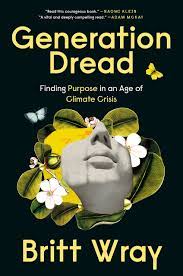Search Results: Returned 7 Results, Displaying Titles 1 - 7
-
-
2014., Adult, Little, Brown Call No: 155.91 N623b Edition: First edition. Availability:1 of 1 At Your Library Summary Note: "We know instinctively that being near water makes us healthier and happier, reduces stress, and brings us peace. But why? A wave of neuroscience, evolutionary biology, and medical research illuminates the physiological and brain processes that underlie our transformative connection to water. Proximity to water can improve performance in a wide range of fields, increase calm and diminish anxiety much better than medication, amplify creativity, artistic and otherwise, increase generosity and compassion, increase professional success, improve our overall health and well-being and reinforce our connection to the natural world and one another"--From publisher description.
-
-
By Wray, Britt2022., Adult, Knopf Canada Call No: 155.915 W943g Availability:1 of 1 At Your Library Summary Note: An impassioned generational perspective on why climate anxiety is completely natural and necessary, and how we can be stronger for it. Climate and environment-related fears and anxieties are on the rise everywhere, with few resources to address them. As with any type of stress, eco-anxiety can lead to paralysis, burnout and avoidance. In Generation Dread, Britt Wray seamlessly merges scientific knowledge with emotional insight to show how these complicated feelings are a sign of our humanity, and acknowledging and valuing them is key to making it through present and future crises. This isn't a simple process, and it's not a level playing field when it comes to our vulnerability, she notes. However, with the worsening situation, we are all on the field--and unlocking deep stores of compassion and care is a crucial step in healing our relationship to the planet and each other. With openness and curiosity, Britt explores her own fears about starting a family when evidence of dangerous environmental shifts creates an especially bleak picture of what lies ahead. Weaving in ? valuable insights from climate-aware therapists; ? reflections on the emotional impact of ecological catastrophes; ? critical perspectives on the role of race and privilege in this crisis; ? ideas about the future of mental health innovation; ? and creative coping strategies to foster connection, meaning and resilience, Generation Dread brilliantly illuminates how we can learn from the past, from our own emotions, and from each other to survive--and even thrive--in a changing world.
-
-
By Sabar, Arielc2011., Da Capo Press Call No: Fic Sab Edition: 1st Da Capo Press ed. Availability:1 of 1 At Your Library
-
-
2017., Adult, Highbridge Co. Edition: Unabridged. Connect to this eAudiobook title. Summary Note: For centuries, poets and philosophers extolled the benefits of a walk in the woods: Beethoven drew inspiration from rocks and trees; Wordsworth composed while tromping over the heath; Nikola Tesla conceived the electric motor while visiting a park. Intrigued by our storied renewal in the natural world, Florence Williams sets out to uncover the science behind nature's positive effects on the brain. From forest trails in Korea, to islands in Finland, to groves of eucalyptus in California, Williams investigates the science at the confluence of environment, mood, health, and creativity. Delving into completely new research, she uncovers the powers of the natural world to improve health, promote reflection and innovation, and ultimately strengthen our relationships. As our modern lives shift dramatically indoors, these ideas and the answers they yield are more urgent than ever.
-
-
Ã2017., Adult, W.W. Norton & Company Call No: 155.9 W723n Edition: First edition. Availability:1 of 1 At Your Library Summary Note: An investigation into the restorative benefits of nature draws on cutting-edge research and the author's explorations with international nature therapy programs to examine the relationship between nature and human cognition, mood, and creativity. --Publisher.
-
-
2015., Chelsea Green Publishing Call No: 155.9 S874w Availability:1 of 1 At Your Library Summary Note: Today, about 98 percent of scientists affirm that climate change is human made, and about 2 percent still question it. Despite that overwhelming majority, though, about half the population of rich countries, like ours, choose to believe the 2 percent. And, paradoxically, this large camp of deniers grows even larger as more and more alarming proof of climate change has cropped up over the last decades. This disconnect has both climate scientists and activists scratching their heads, growing anxious, and responding, usually, by repeating more facts to "win" the argument. But, the more climate facts pile up, the greater the resistance to them grows, and the harder it becomes to enact measures to reduce greenhouse gas emissions and prepare communities for the inevitable change ahead. Is humanity up to the task? It is a catch-22 that starts, says psychologist and climate expert Per Espen Stoknes, from an inadequate understanding of the way most humans think, act, and live in the world around them. With dozens of examples, he shows how to retell the story of climate change and apply communication strategies more fit for the task.--Publisher's description.









![The nature fix [eAudiobook] : why nature makes us happier, healthier, and more creative The nature fix [eAudiobook] : why nature makes us happier, healthier, and more creative](/Library/images/~imageCT102036.JPG)

